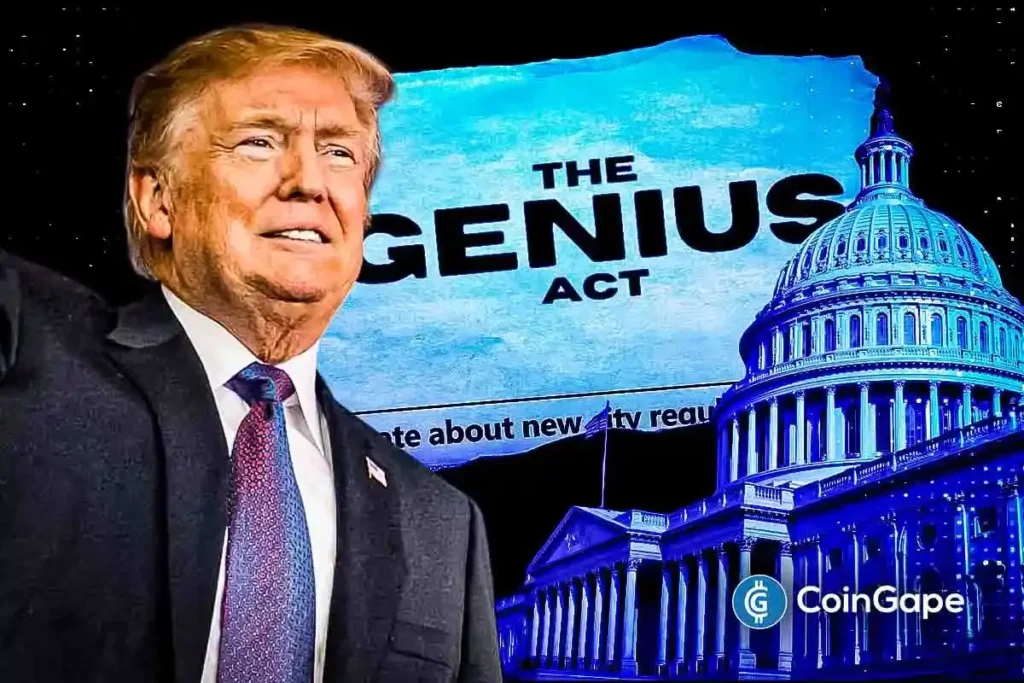Reviving the GENIUS Act: A Game-Changer for Crypto Legislation
The GENIUS Act is regaining traction in Congress, thanks in large part to renewed backing from President Donald Trump and a strategic meeting with House members. This legislation, which aims to provide a federal regulatory framework for dollar-pegged stablecoins, had previously faced setbacks due to internal disagreements among Republicans. However, with a new procedural vote on the horizon, there is optimism that the GENIUS Act could soon be one step closer to becoming law.
Trump’s Strategic Push for the GENIUS Act
In a bold move from the Oval Office, Trump announced the support of 11 congressional members who had initially opposed the act. Following a brief discussion, these lawmakers pledged to support the bill in an upcoming vote. Trump’s involvement seems to have shifted the balance of support, with House Speaker Mike Johnson also joining the discussions via phone. Upon the announcement of a new procedural vote scheduled for July 15, hope surged as lawmakers anticipated the act would clear the House shortly thereafter.
What the GENIUS Act Entails
The GENIUS Act represents a significant evolution in how the U.S. addresses digital currencies. It seeks to create legal pathways for private companies to issue digital currency, while also providing the Treasury Department with oversight authority. This legislation aims to ensure regulatory clarity for dollar-pegged stablecoins, making it a landmark measure at the federal level. Although it had previously cleared the Senate with bipartisan support, concerns lingered among some Democrats regarding potential conflicts of interest tied to Trump.
Market Reactions to Legislative Uncertainty
The uncertainty surrounding the GENIUS Act had an immediate impact on crypto markets, particularly Bitcoin. The price of Bitcoin, which had reached an unprecedented high of $123,260 in anticipation of potential regulatory changes, fell to approximately $115,735 following the earlier failed procedural vote. However, optimism regarding the renewed legislative momentum has spurred a rebound, and prices stabilized around $117,000. This showcases the market’s sensitivity to legislative developments and the importance of regulatory clarity for investors.
Internal Conflicts Within the House
Despite the renewed support for the GENIUS Act, divisions remain among House members. For instance, Rep. Marjorie Taylor Greene has been vocal in criticizing the bill, arguing that it should include a stricter prohibition on central bank digital currencies (CBDCs). She fears that the GENIUS Act could inadvertently open avenues for a government-backed digital currency, which could infringe on the principles of decentralized finance. These internal disagreements highlight the complex landscape of crypto regulation and the challenges of achieving consensus among lawmakers.
Looking Ahead: What’s Next for the GENIUS Act
As the new procedural vote approaches, all eyes will be on Congress. If the GENIUS Act clears this hurdle, it will set the stage for further debate and potentially pave the way for a final vote. The outlook is cautiously optimistic, but the outcome remains uncertain. Evolving market conditions and legislative maneuvers will continue to play a pivotal role in shaping the future of the crypto landscape in the U.S. Investors and crypto enthusiasts are watching closely to see how this important piece of legislation unfolds and what it may mean for the future of digital currency regulation.
The revival of the GENIUS Act marks a critical juncture in America’s approach to digital currencies. With bipartisan support and strategic advocacy from influential leaders, this legislation could set the tone for future crypto regulations, offering much-needed clarity for market participants. As we await the upcoming procedural vote, the focus remains on how this pivotal moment will reshape the U.S. cryptocurrency framework. The world of crypto is evolving rapidly, and every legislative step is vital in determining its trajectory.


